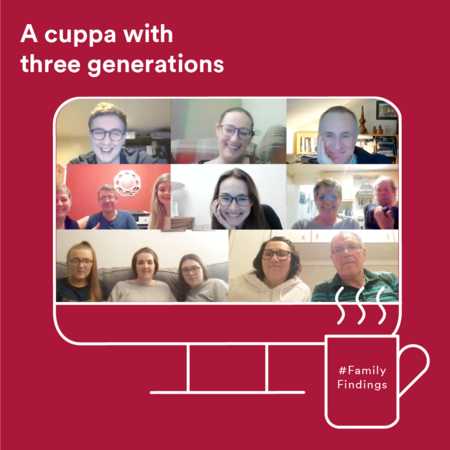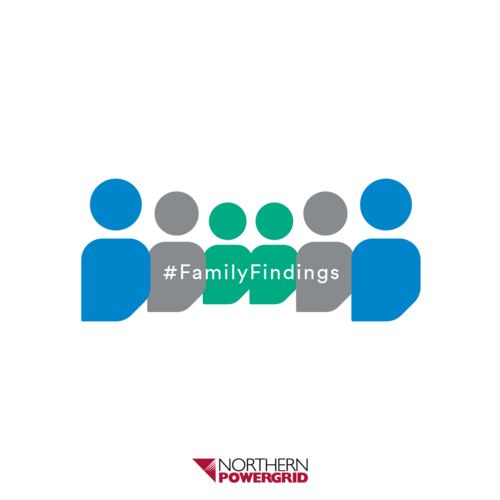
Family chats often evolve into discussions about bigger societal issues.
Climate change has become a dominant topic in recent years, with families and individuals considering their role in solving this climate emergency.
We imagine that discussing your local electricity distribution network is not a regular conversation over a Sunday roast. However, understanding what families across our region think about climate change, and how we can reduce its impact, is fundamental for the business direction Northern Powergrid will take over the coming years, and more importantly, how we support families.
So we’ve been encouraging and hosting family conversations to seek out family views across the area.
Many family get-togethers have been spent over video calls this year, so we took the opportunity to use Zoom and speak to families about their opinions on climate action in their everyday lives. We spoke to three generations of eight families across 15 locations to find out what they think about sustainability and energy.
By using one-to-one conversations, group chats and surveys this research used a brand-new way of engaging customers across our areas. Families were representative across age, gender, race and geography and covered a mix of rural versus urban households and involved homeowners, private renters and those renting social housing.
The Generation Game
COVID-19 has had a huge impact on our lives. It’s made many reconsider priorities and focus on how communities can come together to face a global crisis, be it the corona virus pandemic or climate change. This was the strongest finding from our research. Many of the family members interviewed reflected on their behaviour, and the need for action on climate change.
The research also presented varying attitudes within a family, and how different dynamics can affect what each generation is doing and their intentions to act on climate change.
This snapshot from a small number of families chats suggested that younger people are often the drivers of environmental behaviour change within the family, they are aware of the risks that climate change poses for their futures and they want to bring older family members along with them to support positive environmental actions.
Their parents – the middle generation – said they often want to drive change but find they are too busy with everyday life or too cost conscious to implement positive environmental actions for their family and younger generations. They are also the generation most swayed by incentives and crave impartial advice when making decisions.
Representatives from the older generations we listened to often revealed an emotional desire to support younger generations through environmental action, although many are concerned about the high initial investment of environmental solutions such as heat pumps. The majority were also unsure about where to go for advice.
The Challenges Facing Environmental Action
The majority of the families interviewed want to act more on climate change; it’s clear from the intergenerational breakdown that the middle and older generations find finance and advice key blockers to environmental action.
We asked our families what’s required to motivate action on the climate crisis and found that many people are simply unsure about what to, what decisions to make and what the direct benefits will be for themselves and their families.
Many family decision makers had low levels of trust in private companies advising them on new low carbon technology. This is a key barrier to action for many, as the real lifestyle changes required for climate action are not often transparent.
Most of the families found that understanding the costs and benefits was challenging due to many sources of conflicting advice from companies, friends, neighbours and families. Many also questioned the reliability of advice and recommendations before making big decisions such as a new car or heating.
The families we talked to also believed that government involvement is essential to make changes to their lifestyle and homes, many see it as a catalyst for tackling environmental problems, through advice, incentives, new laws and regulations.
Overall, families want more support from impartial sources that can help guide them through the process of installing low-carbon technology and positive environmental solutions.
What are the older generations doing?
Older generations often consider how their actions will affect future generations as they want to guarantee a good future for their children and grandchildren. However, many of those interviewed do not consider electric vehicles a viable option within their lifetime – some were put off by the change in lifestyle and, for many, the cost of a new vehicle. They do believe, however that it will be a cost-effective option for their children and grandchildren.
Older generations were also happy to pay more in principle to help younger generations tackle environmental problems, but many are concerned about the immediate affordability post COVID-19.
You can learn more from our ‘family value’ chats here.
By Siobhan Barton, Head of Stakeholder Relations, Northern Powergrid
This research project, accompanied with the ED2 engagement campaign will inform Northern Powergrid’s business planning from 2023-2028. All families and businesses are encouraged to review the upcoming proposals that will shape the energy future across the region.




